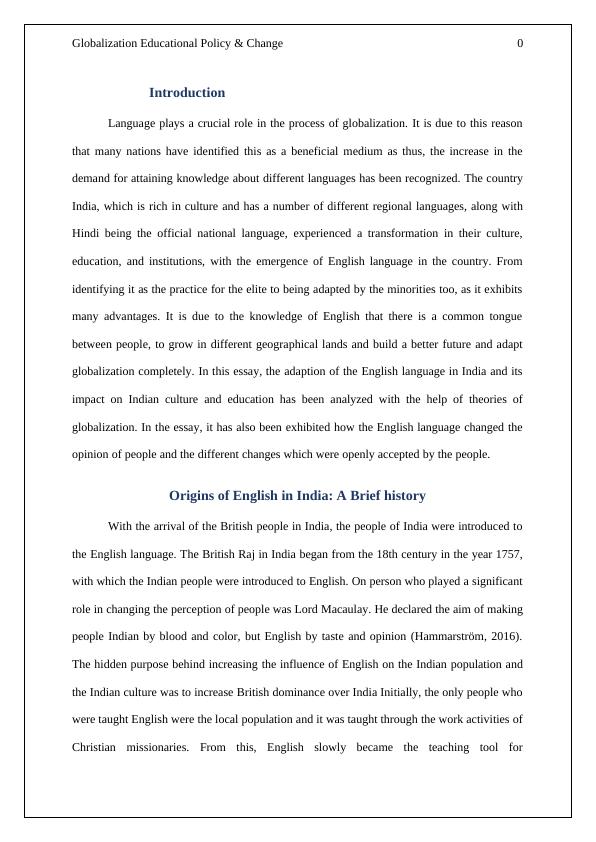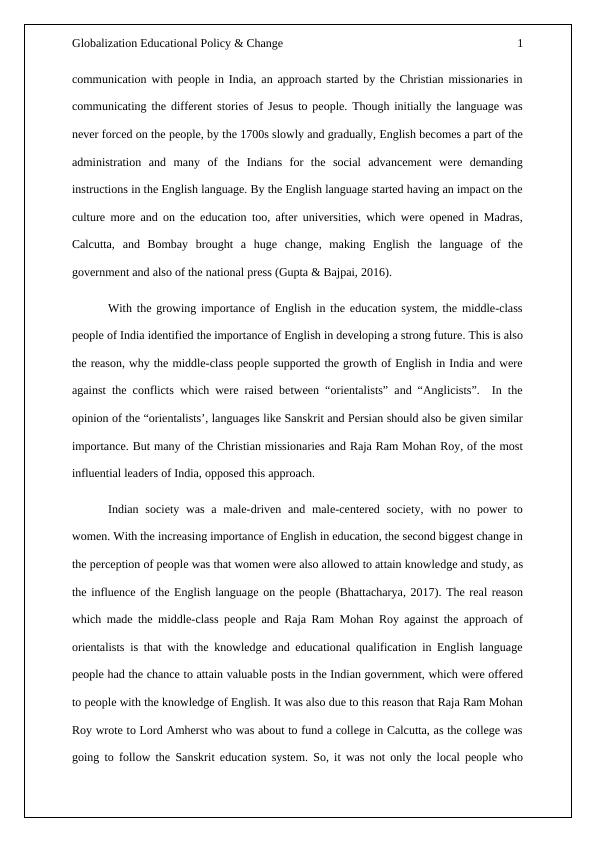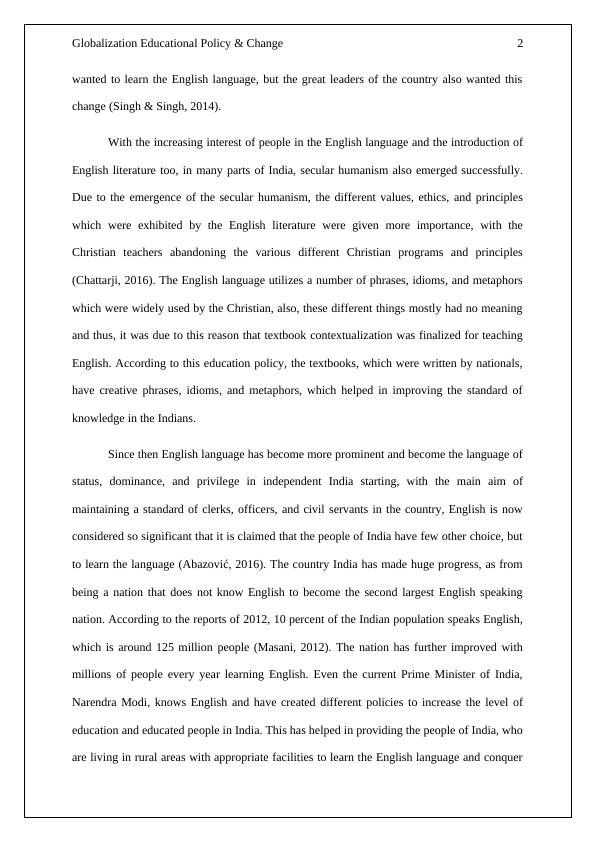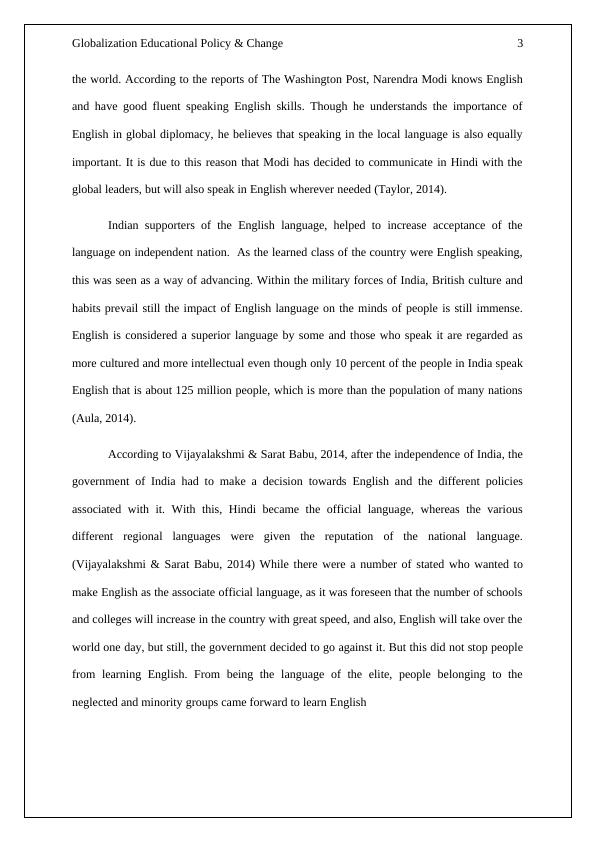Globalization Educational Policy & Change Report 2022
Added on 2022-10-19
12 Pages3610 Words11 Views
Globalization Educational Policy & Change 0
Introduction
Language plays a crucial role in the process of globalization. It is due to this reason
that many nations have identified this as a beneficial medium as thus, the increase in the
demand for attaining knowledge about different languages has been recognized. The country
India, which is rich in culture and has a number of different regional languages, along with
Hindi being the official national language, experienced a transformation in their culture,
education, and institutions, with the emergence of English language in the country. From
identifying it as the practice for the elite to being adapted by the minorities too, as it exhibits
many advantages. It is due to the knowledge of English that there is a common tongue
between people, to grow in different geographical lands and build a better future and adapt
globalization completely. In this essay, the adaption of the English language in India and its
impact on Indian culture and education has been analyzed with the help of theories of
globalization. In the essay, it has also been exhibited how the English language changed the
opinion of people and the different changes which were openly accepted by the people.
Origins of English in India: A Brief history
With the arrival of the British people in India, the people of India were introduced to
the English language. The British Raj in India began from the 18th century in the year 1757,
with which the Indian people were introduced to English. On person who played a significant
role in changing the perception of people was Lord Macaulay. He declared the aim of making
people Indian by blood and color, but English by taste and opinion (Hammarström, 2016).
The hidden purpose behind increasing the influence of English on the Indian population and
the Indian culture was to increase British dominance over India Initially, the only people who
were taught English were the local population and it was taught through the work activities of
Christian missionaries. From this, English slowly became the teaching tool for
Introduction
Language plays a crucial role in the process of globalization. It is due to this reason
that many nations have identified this as a beneficial medium as thus, the increase in the
demand for attaining knowledge about different languages has been recognized. The country
India, which is rich in culture and has a number of different regional languages, along with
Hindi being the official national language, experienced a transformation in their culture,
education, and institutions, with the emergence of English language in the country. From
identifying it as the practice for the elite to being adapted by the minorities too, as it exhibits
many advantages. It is due to the knowledge of English that there is a common tongue
between people, to grow in different geographical lands and build a better future and adapt
globalization completely. In this essay, the adaption of the English language in India and its
impact on Indian culture and education has been analyzed with the help of theories of
globalization. In the essay, it has also been exhibited how the English language changed the
opinion of people and the different changes which were openly accepted by the people.
Origins of English in India: A Brief history
With the arrival of the British people in India, the people of India were introduced to
the English language. The British Raj in India began from the 18th century in the year 1757,
with which the Indian people were introduced to English. On person who played a significant
role in changing the perception of people was Lord Macaulay. He declared the aim of making
people Indian by blood and color, but English by taste and opinion (Hammarström, 2016).
The hidden purpose behind increasing the influence of English on the Indian population and
the Indian culture was to increase British dominance over India Initially, the only people who
were taught English were the local population and it was taught through the work activities of
Christian missionaries. From this, English slowly became the teaching tool for

Globalization Educational Policy & Change 1
communication with people in India, an approach started by the Christian missionaries in
communicating the different stories of Jesus to people. Though initially the language was
never forced on the people, by the 1700s slowly and gradually, English becomes a part of the
administration and many of the Indians for the social advancement were demanding
instructions in the English language. By the English language started having an impact on the
culture more and on the education too, after universities, which were opened in Madras,
Calcutta, and Bombay brought a huge change, making English the language of the
government and also of the national press (Gupta & Bajpai, 2016).
With the growing importance of English in the education system, the middle-class
people of India identified the importance of English in developing a strong future. This is also
the reason, why the middle-class people supported the growth of English in India and were
against the conflicts which were raised between “orientalists” and “Anglicists”. In the
opinion of the “orientalists’, languages like Sanskrit and Persian should also be given similar
importance. But many of the Christian missionaries and Raja Ram Mohan Roy, of the most
influential leaders of India, opposed this approach.
Indian society was a male-driven and male-centered society, with no power to
women. With the increasing importance of English in education, the second biggest change in
the perception of people was that women were also allowed to attain knowledge and study, as
the influence of the English language on the people (Bhattacharya, 2017). The real reason
which made the middle-class people and Raja Ram Mohan Roy against the approach of
orientalists is that with the knowledge and educational qualification in English language
people had the chance to attain valuable posts in the Indian government, which were offered
to people with the knowledge of English. It was also due to this reason that Raja Ram Mohan
Roy wrote to Lord Amherst who was about to fund a college in Calcutta, as the college was
going to follow the Sanskrit education system. So, it was not only the local people who
communication with people in India, an approach started by the Christian missionaries in
communicating the different stories of Jesus to people. Though initially the language was
never forced on the people, by the 1700s slowly and gradually, English becomes a part of the
administration and many of the Indians for the social advancement were demanding
instructions in the English language. By the English language started having an impact on the
culture more and on the education too, after universities, which were opened in Madras,
Calcutta, and Bombay brought a huge change, making English the language of the
government and also of the national press (Gupta & Bajpai, 2016).
With the growing importance of English in the education system, the middle-class
people of India identified the importance of English in developing a strong future. This is also
the reason, why the middle-class people supported the growth of English in India and were
against the conflicts which were raised between “orientalists” and “Anglicists”. In the
opinion of the “orientalists’, languages like Sanskrit and Persian should also be given similar
importance. But many of the Christian missionaries and Raja Ram Mohan Roy, of the most
influential leaders of India, opposed this approach.
Indian society was a male-driven and male-centered society, with no power to
women. With the increasing importance of English in education, the second biggest change in
the perception of people was that women were also allowed to attain knowledge and study, as
the influence of the English language on the people (Bhattacharya, 2017). The real reason
which made the middle-class people and Raja Ram Mohan Roy against the approach of
orientalists is that with the knowledge and educational qualification in English language
people had the chance to attain valuable posts in the Indian government, which were offered
to people with the knowledge of English. It was also due to this reason that Raja Ram Mohan
Roy wrote to Lord Amherst who was about to fund a college in Calcutta, as the college was
going to follow the Sanskrit education system. So, it was not only the local people who

Globalization Educational Policy & Change 2
wanted to learn the English language, but the great leaders of the country also wanted this
change (Singh & Singh, 2014).
With the increasing interest of people in the English language and the introduction of
English literature too, in many parts of India, secular humanism also emerged successfully.
Due to the emergence of the secular humanism, the different values, ethics, and principles
which were exhibited by the English literature were given more importance, with the
Christian teachers abandoning the various different Christian programs and principles
(Chattarji, 2016). The English language utilizes a number of phrases, idioms, and metaphors
which were widely used by the Christian, also, these different things mostly had no meaning
and thus, it was due to this reason that textbook contextualization was finalized for teaching
English. According to this education policy, the textbooks, which were written by nationals,
have creative phrases, idioms, and metaphors, which helped in improving the standard of
knowledge in the Indians.
Since then English language has become more prominent and become the language of
status, dominance, and privilege in independent India starting, with the main aim of
maintaining a standard of clerks, officers, and civil servants in the country, English is now
considered so significant that it is claimed that the people of India have few other choice, but
to learn the language (Abazović, 2016). The country India has made huge progress, as from
being a nation that does not know English to become the second largest English speaking
nation. According to the reports of 2012, 10 percent of the Indian population speaks English,
which is around 125 million people (Masani, 2012). The nation has further improved with
millions of people every year learning English. Even the current Prime Minister of India,
Narendra Modi, knows English and have created different policies to increase the level of
education and educated people in India. This has helped in providing the people of India, who
are living in rural areas with appropriate facilities to learn the English language and conquer
wanted to learn the English language, but the great leaders of the country also wanted this
change (Singh & Singh, 2014).
With the increasing interest of people in the English language and the introduction of
English literature too, in many parts of India, secular humanism also emerged successfully.
Due to the emergence of the secular humanism, the different values, ethics, and principles
which were exhibited by the English literature were given more importance, with the
Christian teachers abandoning the various different Christian programs and principles
(Chattarji, 2016). The English language utilizes a number of phrases, idioms, and metaphors
which were widely used by the Christian, also, these different things mostly had no meaning
and thus, it was due to this reason that textbook contextualization was finalized for teaching
English. According to this education policy, the textbooks, which were written by nationals,
have creative phrases, idioms, and metaphors, which helped in improving the standard of
knowledge in the Indians.
Since then English language has become more prominent and become the language of
status, dominance, and privilege in independent India starting, with the main aim of
maintaining a standard of clerks, officers, and civil servants in the country, English is now
considered so significant that it is claimed that the people of India have few other choice, but
to learn the language (Abazović, 2016). The country India has made huge progress, as from
being a nation that does not know English to become the second largest English speaking
nation. According to the reports of 2012, 10 percent of the Indian population speaks English,
which is around 125 million people (Masani, 2012). The nation has further improved with
millions of people every year learning English. Even the current Prime Minister of India,
Narendra Modi, knows English and have created different policies to increase the level of
education and educated people in India. This has helped in providing the people of India, who
are living in rural areas with appropriate facilities to learn the English language and conquer

Globalization Educational Policy & Change 3
the world. According to the reports of The Washington Post, Narendra Modi knows English
and have good fluent speaking English skills. Though he understands the importance of
English in global diplomacy, he believes that speaking in the local language is also equally
important. It is due to this reason that Modi has decided to communicate in Hindi with the
global leaders, but will also speak in English wherever needed (Taylor, 2014).
Indian supporters of the English language, helped to increase acceptance of the
language on independent nation. As the learned class of the country were English speaking,
this was seen as a way of advancing. Within the military forces of India, British culture and
habits prevail still the impact of English language on the minds of people is still immense.
English is considered a superior language by some and those who speak it are regarded as
more cultured and more intellectual even though only 10 percent of the people in India speak
English that is about 125 million people, which is more than the population of many nations
(Aula, 2014).
According to Vijayalakshmi & Sarat Babu, 2014, after the independence of India, the
government of India had to make a decision towards English and the different policies
associated with it. With this, Hindi became the official language, whereas the various
different regional languages were given the reputation of the national language.
(Vijayalakshmi & Sarat Babu, 2014) While there were a number of stated who wanted to
make English as the associate official language, as it was foreseen that the number of schools
and colleges will increase in the country with great speed, and also, English will take over the
world one day, but still, the government decided to go against it. But this did not stop people
from learning English. From being the language of the elite, people belonging to the
neglected and minority groups came forward to learn English
the world. According to the reports of The Washington Post, Narendra Modi knows English
and have good fluent speaking English skills. Though he understands the importance of
English in global diplomacy, he believes that speaking in the local language is also equally
important. It is due to this reason that Modi has decided to communicate in Hindi with the
global leaders, but will also speak in English wherever needed (Taylor, 2014).
Indian supporters of the English language, helped to increase acceptance of the
language on independent nation. As the learned class of the country were English speaking,
this was seen as a way of advancing. Within the military forces of India, British culture and
habits prevail still the impact of English language on the minds of people is still immense.
English is considered a superior language by some and those who speak it are regarded as
more cultured and more intellectual even though only 10 percent of the people in India speak
English that is about 125 million people, which is more than the population of many nations
(Aula, 2014).
According to Vijayalakshmi & Sarat Babu, 2014, after the independence of India, the
government of India had to make a decision towards English and the different policies
associated with it. With this, Hindi became the official language, whereas the various
different regional languages were given the reputation of the national language.
(Vijayalakshmi & Sarat Babu, 2014) While there were a number of stated who wanted to
make English as the associate official language, as it was foreseen that the number of schools
and colleges will increase in the country with great speed, and also, English will take over the
world one day, but still, the government decided to go against it. But this did not stop people
from learning English. From being the language of the elite, people belonging to the
neglected and minority groups came forward to learn English

End of preview
Want to access all the pages? Upload your documents or become a member.
Related Documents
Dissension in Sri Lanka Due to English Languagelg...
|4
|1048
|482
Architecture of British India Represented and Promoted a ‘civilizing’ influence - Essaylg...
|9
|2935
|326
(PDF) Cross-cultural management in practicelg...
|8
|1960
|51
Physical, Social and Cultural Features of Tourist Destinationslg...
|16
|1086
|369
Residential Schools and the Process of Assimilation in Canadalg...
|7
|1857
|340
Challenges Faced by Students in Listening at University and Methods to Develop Active Listening Abilitieslg...
|9
|2634
|64
